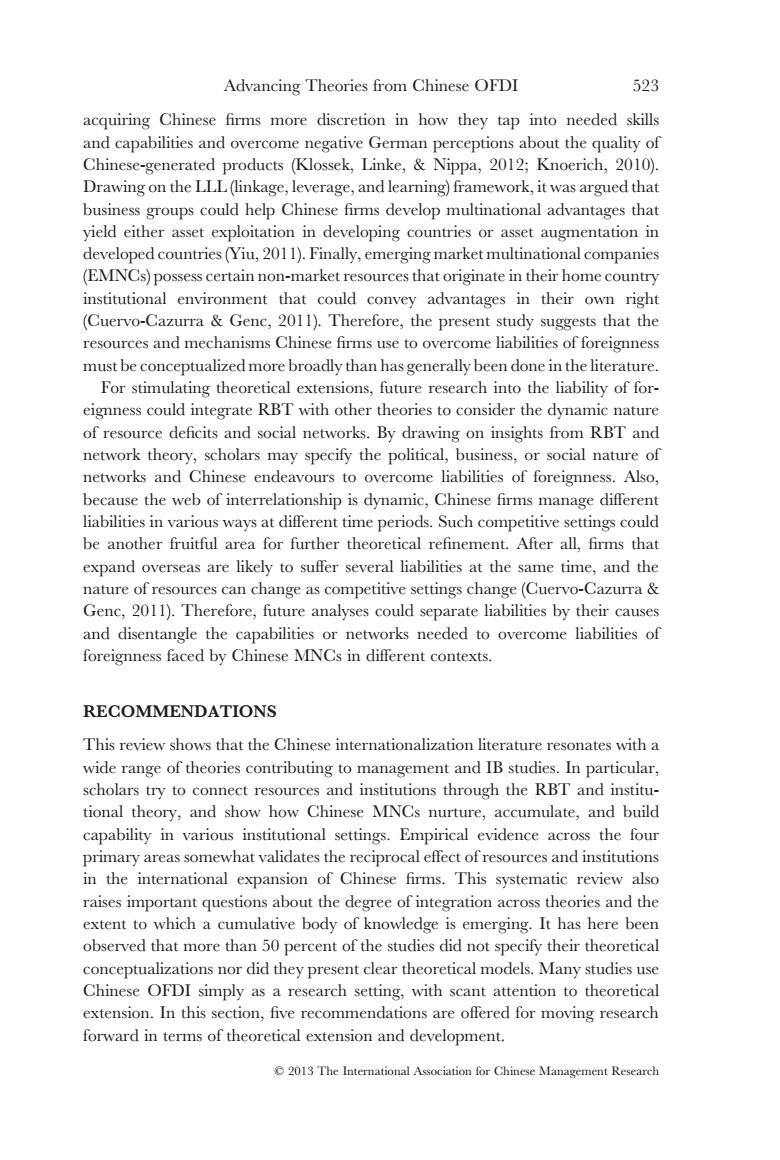正在加载图片...

Advancing Theories from Chinese OFDI 523 acquiring Chinese firms more discretion in how they tap into needed skills and capabilities and overcome negative German ionsabou the quality of Drawing on the LLL(linkage,leverage,and learning)framework.it was argued that business groups could help Chinese firms develop multinational advantages that yield eithe asset exploitation in developing countries or asset augn entation in developed countries(Yiu,2011).Finally,emerging market multinational companies (EMNCs)possess certain non-market resources that originate in their home country institutional environment that could convey advantages in their own right (Cuervo-Cazurra Genc,2011).Therefore,the presen udy sug吗 ests that the resources and mechanisms Chinese firms use to overcome liabilities of foreignness must be conceptualzed more broadly than has generally been done in the lterature For stimulating theoretical extensions,future research into the liability of for- eignness coud integrate RBT with other theores to the dynamic nature of resource deficits and social networks.By drawing on insights from RBT and network theory,scholars may specify the political,business,or social nature of networks and Chinese endeavours to overcome liabilities of foreignness.Also, 00 ause the web of interrelationship is dynamic,Chinese firms manage differen liabilities in various ways at different time periods.Such competitive settings could be another fruitful area for further theoretical refinement.After all,firms that expand overseas are likely to suffer several liabilities at the same time,and the nature of resources can change as competitive settings change (Cuervo-Cazurra& Genc,2011).Therefore,future analyses could separate liabilities by their causes and disentangle the capabilities or networks needed to overcome liabilities of foreignness faced by Chinese MNCs in different contexts. RECOMMENDATIONS This review shows that the Chinese internationalization literature resonates with a wide range of theories contributing to management and IB studies.In particular, scholars try to connect resources and institutions through the RBT and institu- tional theory,and show how Chinese MNCs nurture,accumulate,and build capability in various institutional settings.Empirical evidence acros the four primary areas somewhat validates the reciprocal effect of resources and institutions in the international expansion of Chinese firms.This systematic review also raises important questions about the degree of integration across theories and the extent to which a cumulative body of knowledge is emerging.It has here been observed that more than 50 percent of the studies did not specify their theoretical conceptualizations nor did they present clear theoretical models.Many studies use Chinese OFDI simply as a research setting,with scant attention to theoretical extension.In this section,five recommendations are offered for moving research forward in terms of theoretical extension and development. 2013 The International Association for Chinese Management Research acquiring Chinese firms more discretion in how they tap into needed skills and capabilities and overcome negative German perceptions about the quality of Chinese-generated products (Klossek, Linke, & Nippa, 2012; Knoerich, 2010). Drawing on the LLL (linkage, leverage, and learning) framework, it was argued that business groups could help Chinese firms develop multinational advantages that yield either asset exploitation in developing countries or asset augmentation in developed countries (Yiu, 2011). Finally, emerging market multinational companies (EMNCs) possess certain non-market resources that originate in their home country institutional environment that could convey advantages in their own right (Cuervo-Cazurra & Genc, 2011). Therefore, the present study suggests that the resources and mechanisms Chinese firms use to overcome liabilities of foreignness must be conceptualized more broadly than has generally been done in the literature. For stimulating theoretical extensions, future research into the liability of foreignness could integrate RBT with other theories to consider the dynamic nature of resource deficits and social networks. By drawing on insights from RBT and network theory, scholars may specify the political, business, or social nature of networks and Chinese endeavours to overcome liabilities of foreignness. Also, because the web of interrelationship is dynamic, Chinese firms manage different liabilities in various ways at different time periods. Such competitive settings could be another fruitful area for further theoretical refinement. After all, firms that expand overseas are likely to suffer several liabilities at the same time, and the nature of resources can change as competitive settings change (Cuervo-Cazurra & Genc, 2011). Therefore, future analyses could separate liabilities by their causes and disentangle the capabilities or networks needed to overcome liabilities of foreignness faced by Chinese MNCs in different contexts. RECOMMENDATIONS This review shows that the Chinese internationalization literature resonates with a wide range of theories contributing to management and IB studies. In particular, scholars try to connect resources and institutions through the RBT and institutional theory, and show how Chinese MNCs nurture, accumulate, and build capability in various institutional settings. Empirical evidence across the four primary areas somewhat validates the reciprocal effect of resources and institutions in the international expansion of Chinese firms. This systematic review also raises important questions about the degree of integration across theories and the extent to which a cumulative body of knowledge is emerging. It has here been observed that more than 50 percent of the studies did not specify their theoretical conceptualizations nor did they present clear theoretical models. Many studies use Chinese OFDI simply as a research setting, with scant attention to theoretical extension. In this section, five recommendations are offered for moving research forward in terms of theoretical extension and development. Advancing Theories from Chinese OFDI 523 © 2013 The International Association for Chinese Management Research